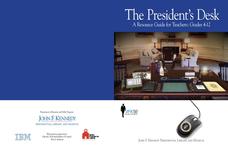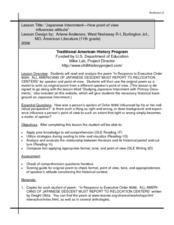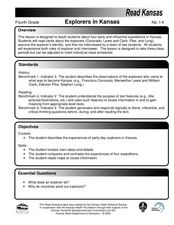Virginia Department of Education
Freshwater Food Chains
What's in the water? Encourage your class to further explore this question and learn about pond ecosystems, food chains, and food webs as they complete this hands-on activity. They view the environment from a new perspective after...
Curated OER
Exploring Arizona's Biotic Communities Lesson 4: Which Team Are You On?
Who is not drawn to trading cards? In this lesson, junior ecologists create a trading card of an animal or plant from one of Arizona's biotic communities. Gorgeous sample cards are provided in the lesson plan as well as a plethora of...
Staples Foundation For Learning
The President’s Desk
What stories can a desk paperweight and picture frame possibly tell us about the president of the United States? Pupils are transported to the desk of President John F. Kennedy through an engaging interactive site. The guide offers a...
Curated OER
Socratic Seminar on Martin Luther King, Jr.’s Letter From Birmingham Jail
Key in the struggle to gain the rights of democratic citizenship was the April 1963 arrest of Dr. Martin Luther King, Jr. for civil disobedience. To deepen their knowledge and understanding of events during the civil rights movement,...
Curated OER
It's a Matter of Opinion
Dissect the parts of an advertisement with your class. Middle schoolers discuss advertisements and locate the hook in them. Then, they create an advertisement for a business, in which they include the name of the business, an...
Gateways
Teaching the Easter Story
If you are looking for a secular approach to teaching about Easter, this may just be the resource for you. Pupils read a paraphrased text depicting the last supper, arrest, and crucifixion of Jesus Christ as told in the Bible, while also...
California Department of Education
Plagiarism is Stealing!
Stop, thief! Do your pupils understand the consequences of plagiarism? Lesson three of six in a series of college and career readiness activities demonstrates the dangers of taking credit for someone else's work. Learners engage in...
California Department of Education
Evaluating Web Sites
If it's on the Internet, it must be true—right? How can someone tell if a website contains less-than-truthful information? Savvy surfers evaluate sources in the fifth of a six-part college and career readiness instructional activity...
Curated OER
Ego Trip- Exploring the Inner Workings of the Human Body
Students gain an understanding of how systems and organs in the human body work. They create their own fictional account of a trip through the human body, and describe one response the body makes to stimuli.
Curated OER
The Scientific Search for the Loch Ness Monster
Students gain an understanding of the real world applications of the scientific method. They design their own experiments to prove or disprove the existence of other modern legends, and they design and carry out an experiment to test a...
Curated OER
Tell a Ton of Tall Tales
Elementary schoolers read many tall tales. They create their own tall tale about a specific event of their choosing. They must act the part of the author. This well-designed lesson takes three class sessions to complete, and is...
Curated OER
Picture This
Elementary writers practice writing descriptive paragraphs by adding adjectives and sensory words to their writing. They use a picture of a monster for their descriptive paragraph. This 12-page lesson should increase your charges...
Curated OER
Japanese Internment--How Point of View Influences Attitude
How does background and experience influence one's point of view? Dwight Okita's famous poem about the Japanese internment is the text used to explore this essential question. Class members study primary documents to gain the necessary...
Curated OER
Explorers in Kansas
Fourth graders read cards about the explorers: Coronado, Lewis, and Clark, Pike, and Long. In this influential expeditions lesson, 4th graders describe and observe explorers who came to Kansas. Students locate main reasons and details as...
Curated OER
The Chesapeake Bay in Captain John Smith's Time
When Captain John Smith visited the Chesapeake Bay in the summer of 1608, what types of animals and habitats did he encounter? Your young historians will analyze primary source documents to answer this question, as well as compare the...
Everett Public Schools
High School Writing: Student Guide
Here's an amazing writing guide that deserves a place in your curriculum library. The 136-page packet provides focus lessons on the writing process, expository, persuasive, and timed writing, the Cornell system of note taking, and more....
Virginia Department of Education
Exploring 3-D Geometry
Take young mathematicians on an exploration of the world of 3-D geometry with this seven-lesson unit. After first defining the terms perimeter, area, and volume and how they apply to the real world, students continue on to learn the...
Louisiana Department of Education
Comprehensive Curriculum Social Studies (Grade 7)
US history from 1776 through 1877 is the focus of a comprehensive curriculum guide designed for seventh graders. Each of the seven units in the 102-page packet includes a list of guiding questions, grade-level expectations, links to...
Virginia Department of Education
Matter and Energy: Equations and Formulas
Using simple materials, an informative lesson demonstrates the Law of Conservation of Matter and explains how to balance chemical equations. Young chemists perform experiments, analyze reactions, and balance chemical equations on their...
Virginia Department of Education
The Rate of a Chemical Reaction
If your pupils think a catalyst is a list of their cats, then this might be the lesson for you! Young chemists study the effect of temperature, catalysts, concentration, and particle size on reaction rates during four different...
Virginia Department of Education
Physical and Chemical Properties of Water
How can you effectively provide detailed concepts of water properties to your high school class in a way they find exciting and challenging at the same time? By letting them play, of course! Through a variety of experiments, pupils...
Virginia Department of Education
Photosynthesis and Cellular Respiration
Provide high schoolers with their own indoor gardens! Emerging scientists discuss the process of photosynthesis and germinate seeds before growing plants in multiple lighting conditions. The hands-on application allows pupils to see...
Virginia Department of Education
Metals, Nonmetals, and Metalloids
How can one easily classify metals, nonmetals, and metalloids? Pupils answer this question as they experiment with unknown substances and perform tests on conductivity, brittleness, and malleability to determine which unknown belongs in...
Virginia Department of Education
The Effects of Heat and Acid on the Enzyme Catalase
How quickly do enzymatic reactions occur? Assist the class as they examine heat and pH change to determine the rate of chemical reactions using catalase as an enzyme. Watch them "glow" with excitement!

























